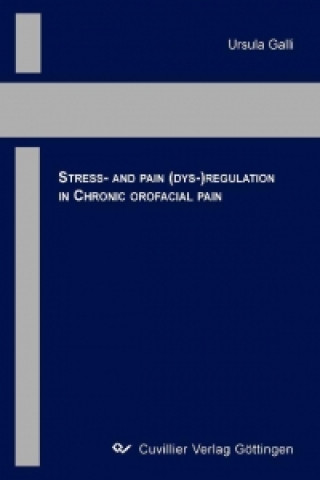
Kod: 12733153
Stress - and - Pain - (Dys)Regulation in Chronic Orofacial Pain
Autor Ursula Galli
The aim of this research was to examine patients with chronic orofacial pain with regard to two significant facets of stress and pain regulation ű on the one hand the neuroendocrinological system of the hypothalamic-pituitary-adr ... więcej
- Język:
 Angielski
Angielski - Oprawa: Miękka
- ISBN-13: 9783867277808
Wydawca: Cuvillier Verlag, 2008
- Więcej informacji o książce

Zobacz książki o podobnej tematyce
Powiadomienie o dostępności
Wpisz swój adres e-mail, aby otrzymać od nas powiadomienie,
gdy książka będzie dostępna. Proste, prawda?
Więcej informacji o Stress - and - Pain - (Dys)Regulation in Chronic Orofacial Pain
 Opis
Opis
The aim of this research was to examine patients with chronic orofacial pain with regard to two significant facets of stress and pain regulation ű on the one hand the neuroendocrinological system of the hypothalamic-pituitary-adrenal axis and on the other hand subjective illness beliefs, as measured by LeventhalĆs self-regulation model (SRM) (Leventhal et al., 1998). The significant effect of psychological and psychosocial factors on the chronicity of pain has been proved in numerous empirical studies and although stress has been investigated for some time as one of the most important psychosocial factors of chronic orofacial pain, there are hardly any studies that examine the underlying mechanisms of the hypothalamic-pituitary-adrenal axis. For this reason we conducted two studies at the interdisciplinary orofacial pain consultant service at the Center for Dental and Oral Medicine and Craniomaxillofacial Surgery of the University of Zurich. The first study investigated a possible dysregulation of the HPA axis by means of the ôlow-dose dexamethasone testö. Twenty patients (17 females, 3 males) with chronic myogenous facial pain were dentally examined according to the criteria for RDC/TMD. Further, each underwent a personal interview and completed a series of questionnaires (DIAX, HADS-D, Fatigue Scale, VAS Scales of pain intensity and quality of sleep). The control group comprised 20 healthy subjects, matched by gender, age and BMI. Salivary cortisol was measured on two consecutive days (awakening and daytime profile). 0,5 mg of dexamethasone was administered on the first evening. Results: in comparison to controls, chronic myogenous facial pain patients showed enhanced and prolonged suppression of cortisol following the administration of 0,5 mg of dexamethasone. Unstimulated cortisol response to awakening and daytime cortisol levels did not differ between the groups. Dysregulation in terms of enhanced negative feedback suppression exists in chronic myogenous facial pain. The second study investigated the predictive value of illness beliefs on therapy outcome in patients with chronic orofacial pain, as measured by the SRM. Relations could be found between subjective illness beliefs and physical as well as psychological adjustment in various chronic illnesses. No research is available to date with regard to chronic orofacial pain. 152 consecutive patients referred to the interdisciplinary orofacial pain consultant service at the Center for Dental and Oral Medicine and Cranio-maxillofacial Surgery, University of Zurich received questionnaires to assess pain and pain related disability, anxiety, depression as well as physical and mental quality of life at three time points: prior to treatment, three and six months after beginning of treatment. Results: Significant improvement over time was found for all outcome measures except mental quality of life. Results of the regression analysis indicated that believing pain could have serious consequences on oneĆs life (IPQ subscale consequences) is one of the most important predictors for treatment outcome regarding pain as well as mood in patients with chronic orofacial pain. The belief in low personal control and in a chronic timeline are shown to be predictive for outcome as well, explaining however a smaller proportion of variance. These results provided evidence that even when controlled for pain and mood, beliefs about pain are important predictors for treatment outcome and need to be considered in in the management of patients with chronic orofacial pain. Asking patients about their view of illness can provide essential information about these important predictors. Taken together both studies are in line with a multifactorial etiology of chronic facial pain, shifting the perspective away from a local towards a more central etiology with dysregulations in the stress and pain modulating system and pain related beliefs as important psychological determinants of adjustment to chronic pain.
 Szczegóły książki
Szczegóły książki
- Pełny tytuł: Stress - and - Pain - (Dys)Regulation in Chronic Orofacial Pain
- Autor: Ursula Galli
- Język:
 Angielski
Angielski - Oprawa: Miękka
- EAN: 9783867277808
- ISBN: 386727780X
- ID: 12733153
- Wydawca: Cuvillier Verlag
- Waga: 152 g
- Wymiary: 208 × 144 × 10 mm
- Data wydania: 27. October 2008
Ulubione w innej kategorii
-

Dune
50.32 zł -3 % -

Haunting Adeline
125.47 zł -1 % -

Berserk Deluxe Volume 2
212.67 zł -1 % -

White Nights
10.94 zł -28 % -

Powerless
48.61 zł -11 % -

Atomic Habits
57.35 zł -28 % -

Dune Messiah
46.20 zł -3 % -

Berserk Deluxe Volume 3
217.79 zł -3 % -

One Day
34.25 zł -44 % -

Berserk Deluxe Volume 1
211.26 zł -2 % -

Iron Flame
60.97 zł -28 % -

Surrounded by Idiots
36.66 zł -28 % -

Harry Potter and the Prisoner of Azkaban (Minalima Edition)
169.97 zł -2 % -

Gravity Falls Journal 3
89 zł -

Heaven Official's Blessing: Tian Guan Ci Fu (Novel) Vol. 1
89.40 zł -

The Creative Act
102.66 zł -12 % -

Dune
47.21 zł -23 % -

Hunting Adeline
125.97 zł -4 % -

A Little Life
48.61 zł -11 % -

Children of Dune
46.61 zł -2 % -

Heaven Official's Blessing: Tian Guan Ci Fu (Novel) Vol. 2
77.55 zł -14 % -

Bungo Stray Dogs, Vol. 8 (light novel)
65.39 zł -4 % -

Percy Jackson and the Olympians 5 Book Paperback Boxed Set
126.67 zł -34 % -

Solo Leveling, Vol. 1
86.49 zł -3 % -

The Prisoner's Throne
44.80 zł -12 % -

Court of Thorns and Roses
33.85 zł -31 % -

Cry Baby Coloring Book
47.21 zł -1 % -

Fourth Wing
71.72 zł -15 % -

Icebreaker
37.46 zł -21 % -

Berserk Deluxe Volume 6
217.79 zł -3 % -

Avatar, the Last Airbender: The Kyoshi Novels (Box Set)
165.75 zł -4 % -

The 48 Laws of Power
98.24 zł -14 % -

House of Leaves
123.76 zł -3 % -

Twisted Lies
36.66 zł -28 % -

Dune Messiah
50.32 zł -12 % -

No Longer Human
56.35 zł -8 % -

48 Laws Of Power
60.97 zł -28 % -

Twisted Games
35.05 zł -31 % -

Caraval Paperback Boxed Set
175.10 zł -3 % -

Solo Leveling, Vol. 2
74.83 zł -23 % -

Open Circuits
168.97 zł -2 % -

Berserk Deluxe Volume 5
223.72 zł -

Heaven Official's Blessing: Tian Guan Ci Fu (Novel) Vol. 3
78.05 zł -13 % -

Berserk Deluxe Volume 4
208.35 zł -3 % -

Court of Mist and Fury
33.85 zł -31 % -

SOLO LEVELING V08
88.20 zł -1 % -

English File Upper Intermediate Multipack A (4th)
92.82 zł -1 % -

CHAINSAW MAN V14
43.49 zł -21 % -

Before the Coffee Gets Cold
36.16 zł -21 %
zadowolonych klientów
Od roku 2008 obsłużyliśmy wielu miłośników książek, ale dla nas każdy był tym wyjątkowym.
Copyright! ©2008-24 libristo.pl Wszelkie prawa zastrzeżonePrywatnieCookies




 21 milionów książek
21 milionów książek Dostawa 10.99 zł
Dostawa 10.99 zł (32) 444 93 66 (8-15.30h)
(32) 444 93 66 (8-15.30h)